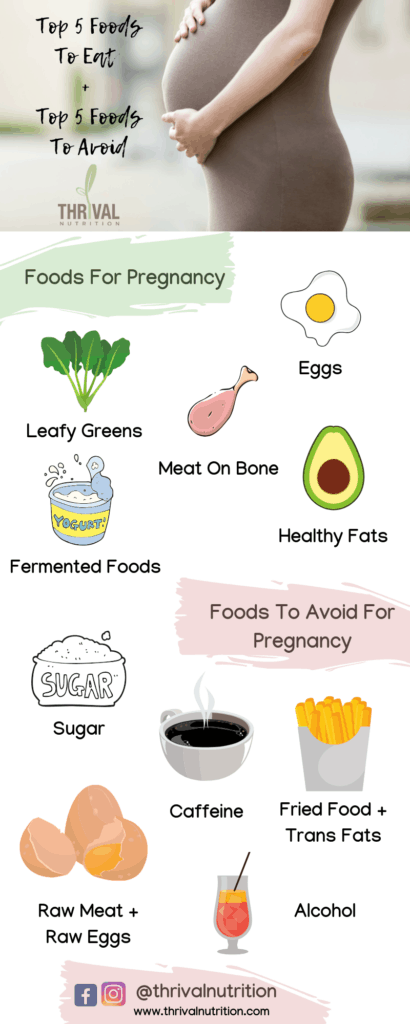
05 Sep Pregnancy Foods To Have + Avoid + Alternatives to the Glucose Test Drink
We all know that taking prenatal vitamins for pregnancy is important, however getting your nutrients from FOOD is so much better. The nutrients naturally occurring in whole foods are far more bioavailable to your body (meaning your body is able to better recognize and absorb the vitamins, minerals, and nutrients). Most women also know that diet is important for the proper development of their baby, but they aren’t sure what exactly should be eaten during pregnancy. I wanted to dive deeper into the question what pregnancy foods to have.
Diet during pregnancy can affect organ development, brain development, birth weight, mental health, eating habits, and even long term health of the baby. So, let’s get into the top 5 most powerful foods to eat during this special time, along with what foods to avoid! We will also get into alternatives for the sugary and chemical laden glucose test drink at the end, so keep reading! I want to preface by saying that eating an overall balanced diet and with all food groups is super important – these are just 5 specific foods that are extremely nutrient rich for this special stage! So, what pregnancy foods to have?
Top 5 Pregnancy Foods
- Eggs
- Eggs are a great source of protein, and the #1 food source of choline, which plays an important role in the development and health of the placenta. The only other food with as much choline as eggs is liver, which most people today aren’t necessarily eating on a regular basis… Additionally, eggs are an amazing source of DHA, an omega-3 fatty acid that is a primary structural component of the human brain, cerebral cortex, skin, and retina. The quality of the eggs you are eating matters as well – organic, free range eggs will be the highest in these nutrients as compared to conventional!
- Dark Leafy Greens
- Dark leafy greens are nature’s primary food source of folate, an essential pregnancy nutrient primarily due to its effectiveness in preventing neural tube defects. Folate is better absorbed when paired with fat, so adding salad dressing with olive oil or avocado oil, cooking greens in ghee, adding avocado to your greens, etc. will make folate more bioavailable to the body. My favorite dark leafy greens are lacinto kale, collard greens, spinach, and rainbow chard!
- Meat on the BONE
- Most of us don’t eat enough bone in meats. We’re eating chicken breasts, ground beef, etc. and missing out on the benefits of eating bone in meats, the way our ancestors did! Bone, skin, and animal tissue are very high in glycine, which is conditionally essential during pregnancy. Glycine is used to grow bone, skin, and tissues of baby, as well as help mama’s skin adequately stretch without stretch marks. It is also helpful to the uterus, keeping it strong for smooth labor and birth. Animal meats are also rich in iron, B12, and zinc, which are super important during pregnancy. Are there other ways to get glycine aside from animal meat? Yes! Another great source of glycine is COLLAGEN. Collagen is naturally occurring in bone in meats, but is now a popular product available for purchase in powder form. You can consume collagen peptides by adding a scoop into drinks, smoothies, or even just plain water. Our favorite collagen brand is Vital Proteins. Bone broth is another easy and delicious way to consume glycine through collagen, our favorite brand is Kettle + Fire!
- Healthy Fats
- Healthy fats such as avocados, nuts & seeds, salmon, and olive oil are extremely vital for the nourishment of mom and baby during pregnancy. DHA and EPA are two important Omega-3 fatty acids which research has shown to have a positive effect on visual and cognitive development of baby, as well as reduction in the risk of allergies in infants. Overall, healthy fats are going to help develop and sustain the health of yours and your baby’s cells, heart, immune system, brain, and eyes. Try adding a healthy fat into every meal, or snacking on omega-3 rich walnuts as a snack.
- PROBIOTIC Rich Foods
- Sauerkraut, fermented veggies, kefir, kombucha, and organic yogurts are all food sources of probiotics. Probiotics help balance the friendly bacteria in your GI tract, aiding digestion and improving the immune system. The addition of beneficial bacteria to our diet also can improve your mood during this time of extreme changes! Pretty cool, right? New research shows that 80-90% of serotonin production happens in the gut. The healthier your Gi tract is, the better your mood will be! Probiotic consumption during pregnancy can also significantly reduce your risk of complications such as preeclampsia, gestational diabetes, vaginal infections, and allergies!
Top 5 Foods to Avoid During Pregnancy + Alternatives to Glucose Test Drink
- Processed Sugar
- While I’m sure it can be so easy to reach for processed sugary foods and treats during pregnancy, these are definitely not the best for you or your baby. For one, high intake of processed sugars will put you at higher risk for gestational diabetes. Second of all, processed sugars will cause overall extra inflammation in your body during this time, leading to fatigue and many other issues. A new study just found that high intake of processed sugar specifically effects a child’s memory and learning abilities.
- Trans Fats & Fried Foods
- Ladies, you REALLY want to focus on healthy fats during this time, as opposed to unhealthy fats in fried and processed foods. Fried foods can lead to gastrointestinal upset and tummy troubles as well as constipation, especially during pregnancy when your digestion may not be as efficient. Fried foods also contain trans fats, which are a huge concern during this time because they not only increase LDL cholesterol, but also lower levels of heart-protective HDL cholesterol. Trans fats are not only found in fried foods though, they can be found in many other foods as well such most processed baked goods, all processed oils like vegetable oil, margarines, etc. If you are trying to become pregnant, studies have linked trans fats to higher rates of endometriosis and infertility.
- Caffeine
- Caffeine is a tough one. Most women love their coffee, and it can be really hard to give up. Pregnant women are generally advised to limit their caffeine intake to less than 200 mg per day… but I honestly think less is definitely better. First trimester is the time you should be the most careful – aim to limit caffeine completely in order to avoid miscarriage and other complications. Caffeine is absorbed very quickly and passes easily into the placenta and fetus. Since unborn babies and their placentas don’t have the main enzyme needed to metabolize caffeine, high levels can build up. High caffeine intake during pregnancy has been shown to restrict fetal growth and increase the risk of low birth weight at delivery. After the first trimester, you can begin to include lower caffeine beverages like tea.
- Alcohol
- Some doctors say you can have minimal amounts of alcohol later on in pregnancy, but I would suggest steering clear during this time. Alcohol is inflammatory to the body, passes through the placenta to the fetus, and is just not healthy for you or baby. Try viewing this as a fun time to play around with mocktails and try new teas!
- Undercooked or Raw Meat/Eggs
- This is more of a safety one. Intake of these foods can increase your risk of infection from several bacteria or parasites such as Toxoplasma, E. coli, Listeria, and Salmonella. Bacteria may threaten the health of your unborn baby – so we definitely want to avoid meat and eggs in their raw state.

*Ways to Opt Out of the Gross Sugary Drink you Have to Consume for the Glucose Tolerance Test*
The glucose tolerance test is a blood test used to screen for gestational diabetes in pregnant women. They give you a syrupy glucose drink that contains 75grams of processed sugar and multiple other dyes and additives, which we know is not healthy for you or baby. The good news is, you always have the right to refuse any tests. There are a few alternative options to drinking the sugary dye laden drink listed below! Talk with your OB or care provider about which option could work best for you.
- A1C Screening in First Trimester
- This is already done in many hospitals in California. Screening A1C in the first trimester gives you time to make corrective changes if your A1C is on the higher end, and prevents you from having to fast and drink the glucose drink full of refined sugar.
- Monitoring Blood Glucose at Home
- Some health care providers will allow you to use an at home monitor to keep track of your blood glucose levels over a two week span of time. This gives you and your provider more of a full picture of your body’s response to glucose.
- Consuming a Naturally High Glucose Meal at Home Before Coming in for the Test
- Some providers (depending on who you are seeing) will allow you to consume your OWN high glucose meal before coming in for the test. In this case, you would simply consume your favorite meal that is naturally higher in sugar such as starchy vegetables, fruit, smoothies, pancakes, etc. right before coming in for the glucose tolerance test.


